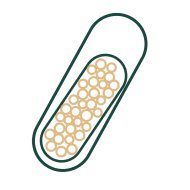
Do you have questions?
Need additional advice? No problem! Ask our team of experts. We'd love to hear from you.
Your cart
Your cart is empty
Continue shoppingYou might also like
Order special instructions
Subscribe to our newsletter and get a 10% discount. Click here and subscribe!
Vitamin K2, or menaquinone, is a form of vitamin K that contributes to normal blood clotting and is found in animal and fermented products. It differs from vitamin K1, which is primarily found in green leafy vegetables.

Vitamin K2, also known as menaquinone, is a form of vitamin K that plays a role in various functions in the body, including blood clotting. Unlike vitamin K1 (phylloquinone), which is primarily found in plant-based products, K2 is mainly present in animal products and fermented foods. There are several subtypes of vitamin K2, labeled MK-4 to MK-13, which differ in structure.
Vitamin K2 contributes to normal blood clotting. This vitamin activates certain proteins that ensure blood can clot properly. A deficiency in vitamin K can disrupt this process and reduce clotting efficiency.
The main difference between vitamin K1 (phylloquinone) and vitamin K2 (menaquinone) lies in their sources and functions. Vitamin K1 is primarily found in green leafy vegetables like spinach and kale, while K2 is mainly present in animal products such as meat, eggs, and dairy, as well as fermented foods like natto. Additionally, K2 remains available in the body for a longer period and is better absorbed by tissues outside the liver.
Natto is a traditional Japanese dish made from fermented soybeans and is one of the richest sources of vitamin K2, particularly the MK-7 subtype. The fermentation process, carried out by the bacterium Bacillus subtilis, produces menaquinone (vitamin K2). Due to its unique texture and strong flavor, it may not appeal to everyone, but it has long been considered a valuable source of nutrients.
Vitamin K2 plays a direct role in the activation of clotting proteins that are essential for the proper functioning of the blood clotting process. These proteins help the body form blood clots, which are necessary to stop bleeding.
Yes, vitamin K2 is available in supplement form and is often combined with other vitamins, such as in the Insentials Smart Vitamins for Her, for Him, and Smart Kids.

Need additional advice? No problem! Ask our team of experts. We'd love to hear from you.
+32 475 75 32 52
